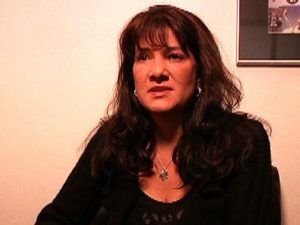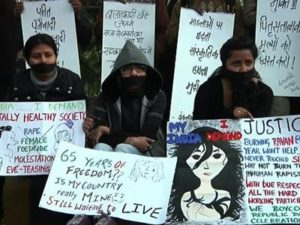
People walk past a makeshift memorial in Sandy Hook, after the December 14 shooting tragedy when a gunman shot …
This is a group nobody wants to be part of.
Few can understand the anguish that families and close friends of murder victims bear. They find ways to cope to make it to the next day. Some take the unnerving step to air their private agonies and speak for their dead.
There have been all too many recent examples. Kevin and Marina Krim left New York to be with family after their nanny allegedly killed their 6-year-old daughter, Lucia “Lulu”, and 2-year-old son, Leo, then attempted suicide. The Krims have not granted any interviews: They weren’t ready, a family member explained. But as they return in a cross-country drive with their 4-year-old daughter, Nessie, they are posting remembrances on the Facebook page of the Lulu & Leo Fund, which seeks to raise money for youth art and science programs. “On the road, we’ve been listening to our Lulu and Leo Playlist,” reads one update. “I want to wish our daughter Nessie a huge happy birthday,” reads another. “Marina and I couldn’t be more proud of her.”

Robbie Parker, the father of six-year-old Emilie who was killed in the Sandy Hook Elementary School shooting, fights …
Robbie Parker, whose 6-year-old daughter Emilie Parker died in the Newtown, Conn., massacre, did more than thank the public for their outpouring. “It is a horrific tragedy, and I want everyone to know that our hearts and prayers go out to them. This includes the family of the shooter,” he said in a press conference. “I cannot imagine how hard this experience is for you. Our love and support goes out to you as well.”
Others speak out in pursuit of justice. Sybrina Fulton, the mother of 17-year-old Trayvon Martin, said last year of her exhaustive media schedule, “I am doing this for a purpose. I know the purpose I am doing it for, and it pushes me forward, giving me the force to go ahead and put my clothes on and do it.” Roxanna Green, whose daughter Christina-Taylor was the youngest victim in the 2011 Tucson spree shooting that left six dead, wrote a book. After the Newtown shootings, however, she chose to appear in a Mayors Against Illegal Guns ad.
In India, where the rape-murder of a 23-year-old physiotherapy student has spurred global protests, the victim’s father and brother have issued a rare plea to publicize her name, in a country where rape cases rarely get convictions and naming victims is illegal. “My daughter didn’t do anything wrong; she died while protecting herself,” the father said in an interview with a British newspaper. “I am proud of her. Revealing her name will give courage to other women who have survived these attacks. They will find strength from my daughter.”
What it takes to speak out
Dan Levey understands this impulse. He is the executive director for the Parents of Murdered Children, a nonprofit founded in 1978 by Robert and Charlotte Hullinger, whose daughter was attacked by her ex-boyfriend. “For many survivors, it’s about honoring our loved ones and telling their stories of who they were,” Levey tells Yahoo. “When survivors choose to speak out, it’s not only therapeutic for them or their families and friends. I think it somehow resonates—or I hope it does—with the public that ‘this is horrific. Look at what these people are going through.'” The media can be an ally in tracking killers, but the focus can be too lopsided. “We can name the perpetrators, but can we name the victims? Often, we can’t,” Levey points out.
Joanne Cacciatore, an Arizona State University professor who studies traumatic loss and child death, says families speak out for the same reason they reach out to friends, support groups and other networks. “They take it public so that they can connect to people,” she explains to Yahoo. Even if they’re not ready to speak directly, as in the case of the Krims, outlets like social media can help when emails, phone calls and media requests overwhelm families.
“Human beings are probably more connected than ever through tragedy,” Cacciatore says. There’s the instinct for empathy, to remember the dead and help the survivors in what she calls a communal mourning process. For crimes that become national tragedies, especially child killings, people also want to hear from victims’ families in order to address their own vulnerability. “Information helps people feel like they’re in control.”
The crusade

Roxanna Green, mother of the youngest victim of the Tucson, Ariz. shooting, says she visited Newtown, Conn. days …
More than a year ago, Green told the Arizona Republic that she preferred to think that her daughter died in a car accident. She and her husband, John, like the Krims, started the Christina-Taylor Green Memorial Foundation to remember their daughter in a “positive way,” and stayed out of politics. After a year of spree shootings in Colorado, Wisconsin and finally Connecticut, she stopped thinking her child was lost, but murdered. Greene told the newspaper, “I’m angry now. … I’m going to take every opportunity to speak out.”
Green follows an all-too-familiar path of grieving families who seek to right a wrong. “It goes from grief to action,” Cacciatore says. Support networks like POMC or activist groups like Mothers Against Drunk Driving emerge. “America’s Most Wanted” came into being after the murder of 6-year-old Adam Walsh.
That desire for tragedy to change a society for the better crosses cultural boundaries. The case in India has highlighted a culture of unequal gender treatment, where selective abortions have led to skewed sex ratios and women are burned for insufficient dowry. “If possible it would be nice to have some sort of law in her name,” the victim’s father told a British news program. “If a hospital or something nice can be named after her, too, at least something good could have come out of all of this—or it’s just all pointless.” Levey understands this sentiment first-hand. He had been in his last semester studying criminal justice, with goals of becoming a juvenile probation officer, when his brother—40-year-old Howard Levey—was carjacked and shot to death. Going through the system led Levey to advocate for victims. It’s a choice that can unsettle some. Some people have asked him, “‘You’re still doing the victims’ rights thing, Dan?’ It doesn’t define me, but it’s certainly part of who I am,” he says. “I would hope the public understands, it never goes away. It’s not a movie with a beginning or an end. … It’s a new normal.”
“Death-avoidance culture”

In India, a young woman who died after being gang-raped and beaten on a bus has been cremated. Her accused attackers …
Another compelling reason families speak out is that they know, somehow, the window to do so is short.
“We’re mesmerized” following a national tragedy, Cacciatore explains. “The public tends to be willing to talk about it and confront it for a certain period of time.” Yet one of the most common complaints from bereaved parents is that few want to talk about their children after a few months. “There’s a not-funny joke in our support group [that] they’re lepers,” Cacciatore says.
Successive editions of the Diagnostic and Statistic Manual of Mental Disorders (DSM-5)—which sets a psychological standard—have shortened the “normal” grieving period from a year to two weeks in the latest edition. According to that, the Newtown families should have resolved acute symptoms of grief by Dec. 28, calculates Cacciatore (who has launched a protest against the change).
Sorrow doesn’t have a timeline. Nor does loss efface someone’s existence. A family of five that loses two children is still a family of five. A birthday or anniversary that comes around is still, to that family, an occasion to remember.
“It’s our own denial of death,” Cacciatore says. “It’s our own inability to confront death.” Living in what she calls a “death-avoidance culture” makes us insensitive to how someone’s passing affects us all. “When we avoid it, we avoid the great lessons.”
